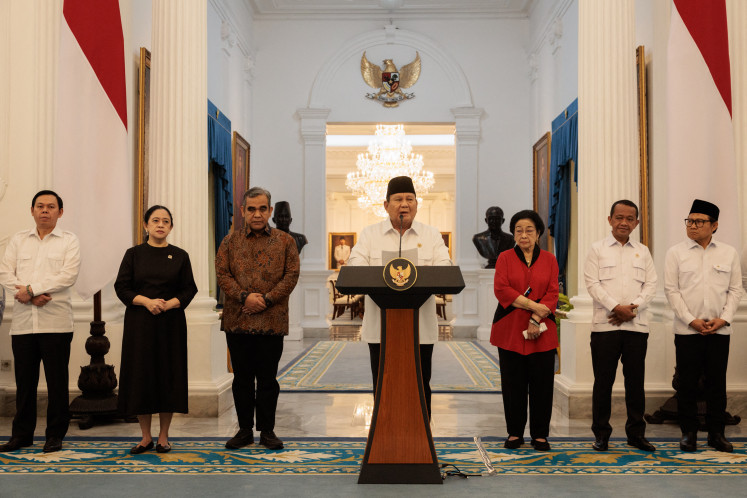Popular Reads
Top Results
Can't find what you're looking for?
View all search resultsPopular Reads
Top Results
Can't find what you're looking for?
View all search resultsIndonesian corporations can leverage data and digital innovation to emerge stronger
Companies across industries have accelerated their investment in digital consumer offerings.
Change text size
Gift Premium Articles
to Anyone
T
he impact of COVID-19 has been profound. Indonesia faced tough times in 2020, even though the government acted decisively to stimulate economic recovery. According to the World Bank, domestic demand is still weaker than before the crisis – at about 2.8 percent below its 2019 level as of September 2020.
Steering companies through dual economic and health crises is daunting, but corporate leaders can use this period to focus on attributes they believe will secure their place in the future. Indonesia’s business leaders can create strategies so their companies can emerge stronger after the pandemic.
To understand what it takes to manage successfully through the pandemic while building for the future, we interviewed around 20 leaders of some of Asia’s top-performing companies.
These men and women believe that the pandemic is a catalyst that will turbocharge existing trends, making it all the more pressing for leaders to boost their companies’ performance. For Indonesia, three accelerating business trends stand out.
First, data and digital innovation are transforming consumer journeys. Even before COVID-19, Asian companies were among the most technologically advanced, serving the world’s most digitally savvy consumers. The pandemic has accelerated this transformation.
McKinsey’s consumer sentiment survey has shown that e-commerce usage has expanded in all countries during the COVID-19 pandemic, with consumers across Asia expected to increase their reliance on online channels. In an Indonesian consumer survey data collected in September 2020, McKinsey’s analysis showed that there was up to a 60 percent net increase in intent to spend online post COVID-19.
In 2020, e-commerce companies in Indonesia are growing at an accelerated rate in response to this demand. In a Bloomberg report, Bukalapak said that its transaction volumes more than doubled in 2020 from a year earlier and that it now has about 100 million users and 13.5 million sellers in Indonesia itself.
Companies across industries have accelerated their investment in digital consumer offerings.
Grab has leveraged its reach and delivery network to create an “ecosystem of digital services” that now includes financial, grocery, and insurance services.
Indonesia’s PT Petrosea seized upon this particular trend, embarking on a comprehensive transformation process by using digital to drive sustainability, efficiency, and operational improvements. “Our new model places us a little bit higher up the value chain and ensures the sustainability of our business. We now offer digital solutions as services,” said president director Hanifa Indradjaya in a September 2020 interview with McKinsey.
Petrosea was able to increase its output in daily production and achieve a decrease in overall costs. “Digitalization helped us perform better than our peers in all dimensions, which is reflected in financial markets,” Indradjaya added.
Asian CEOs also say they are starting to see the payoff from investments in artificial intelligence (AI) and machine learning. According to Samsung’ SDS’s CEO Won-Pyo Hong, the company expects to save around three million working hours in 2020 by incorporating robotic process automation into more than 26,000 projects.
A second key business trend accelerated by the pandemic is consolidation. Stronger companies will find opportunities to consolidate and become bigger, including through merger and acquisition (M&A). “Many countries and sectors don’t have enough equity, and this will give rise to opportunities to consolidate new global champions,” said Piyush Gupta, CEO of DBS Bank.
Our past research shows that companies that keep their portfolios on the move – including being unafraid to divest and rechannel resources to where they predict value creation will be -- tend to enjoy higher total returns to shareholders. Being big, especially in a digital ecosystem, should be a technological advantage.
That said, scale should not come at the expense of a local touch. “Asia is composed of diverse cultures and economies at different stages of development,” said Keith Choy, the regional head of GSK Consumer Healthcare in Asia–Pacific. Choy stressed that global companies must be local to discern, adapt, and respond to customer preferences and needs while maintaining consistency with global branding and reputation.
A third trend that can boost Indonesian companies emerging from the pandemic is the optimization of operating models for speed, agility, and trust.
Most companies in Asia have had to implement remote work to keep their employees safe. This experiment has helped shift mindsets in profound ways, even as CEOs are still figuring out the role that remote work will play after the pandemic subsides. To spur swifter decision making, leaders are flattening organizational structure and pushing decision making down, trusting that employees on the front lines know best what to do. Teams within companies are synergistically collaborating across functions.
To work, a human-centered approach to management must be accompanied by training that prepares employees for the disruptions that technology may bring to their roles. Leading companies in Asia have launched initiatives to improve employees’ data literacy.
Two additional business trends highlighted by the CEOs we spoke with are that Asia will determine its future as intra-regional trade and relationships become ever more important.
And finally, that organizational purpose, which has proved essential for responding to the pandemic, will be equally central to creating resilience for the future. CEOs and other business leaders are emerging from this difficult period with renewed conviction about what it takes to be a successful company in the 21st century.
Understanding these trends and positioning to take advantage of them could be critical differentiators for companies in Indonesia.
***
Joydeep Sengupta is a senior partner at McKinsey & Company’s Singapore office and Phillia Wibowo is the managing partner in McKinsey & Company’s Indonesia office.










